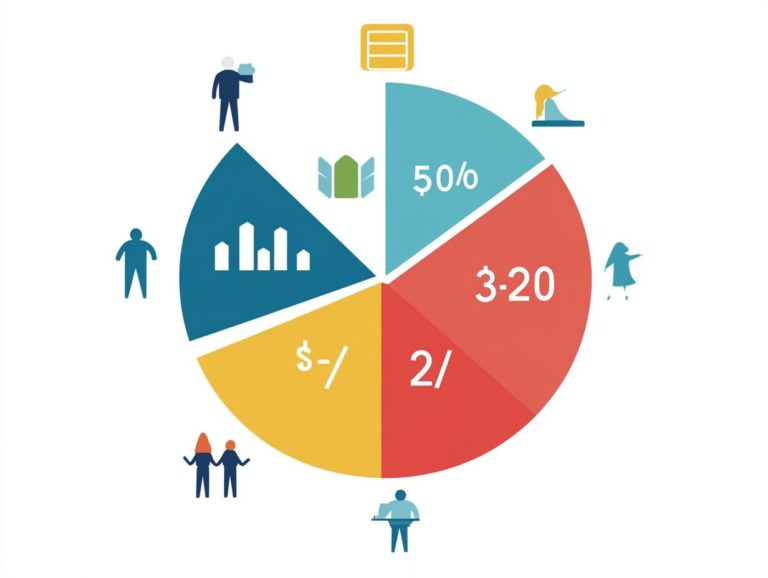How Can I Measure My Budgeting Success?
Budgeting may appear to be a simple endeavor, yet evaluating success transcends mere expense tracking. Discover what true budgeting success looks like and how it can transform your financial journey!
This article delves into what genuine budgeting success entails and how you can define it for your personal financial journey. From critical metrics like savings rates and debt reduction to essential factors such as quality of life, you ll gain valuable insights into measuring your progress.
Explore effective tools whether they re apps or spreadsheets that can assist you in staying on course. Jump in now to uncover the keys to budgeting success and transform your financial future!
Contents
Key Takeaways:

- Tracking your savings rate is a key metric for measuring budgeting success. Aim for a savings rate of at least 20% to ensure long-term financial stability.
- Reducing debt and building an emergency fund are crucial components of successful budgeting. Strive to lower debt and save enough to cover 3-6 months of expenses.
- Don’t forget to consider your quality of life and financial goals when measuring budgeting success. It’s important to find a balance between saving and enjoying your life now and in the future.
Understanding Budgeting Success
Understanding budgeting success is essential for you, whether you re an individual or part of an organization striving for financial stability and knowledge-based decision making. It involves a thorough approach that starts with defining clear financial goals, keeping a close eye on your spending, and adjusting your strategies based on measuring tools.
You can achieve success in budgeting by allocating resources efficiently, enhancing not only your financial health but also helping you achieve strategic objectives like membership growth and event participation. By implementing feedback mechanisms and regularly reviewing budget performance, you can effectively gauge how well you’re meeting your financial targets and identify areas where adjustments may be needed.
Defining Success in Budgeting
Defining success in budgeting requires you to have a clear understanding of your financial goals and how they align with your budgeting process. This means establishing realistic and measurable objectives that truly reflect your priorities, whether as an organization or an individual.
To accurately gauge effectiveness, you should consider various performance indicators, such as net income, which offers valuable insights into profitability, and expense variances that reveal any discrepancies between projected and actual costs. Effective cash flow management is vital, as it determines your ability to meet financial obligations and funding needs.
Incorporating qualitative feedback from stakeholders will help you evaluate the overall impact of your budgeting process. Quantitative metrics will also enhance your analysis, ensuring a balanced approach that not only tracks the numbers but also considers your broader financial health and strategic direction.
Key Metrics for Measuring Budgeting Success
Key metrics for measuring budgeting success offer invaluable insights into your financial health and progress toward your financial goals. These metrics are crucial for evaluating the effectiveness of your budgeting process and pinpointing areas that may need enhancement.
Savings Rate
The savings rate is an essential metric that reveals what portion of your net income is being saved or invested. It serves as a fundamental indicator of your financial health, whether you’re an individual or part of an organization.
To calculate your savings rate, simply divide your total savings by your total income, often expressed as a percentage for clarity. This number not only reflects your current financial habits but also plays a crucial role in your strategic planning. Understanding how much you’re saving enables you to align your financial goals with actionable steps in your budgeting process. A strong savings rate can act as a performance indicator, helping you identify areas that may need adjustment or enhancement.
To boost this metric, consider implementing various strategies such as:
- Automating contributions to your savings accounts
- Reviewing and cutting unnecessary expenses
- Setting clear savings targets
Each of these strategies contributes to achieving your financial objectives more efficiently.
Take charge of your budgeting journey today and begin implementing these strategies for financial success!
Debt Reduction

Debt reduction is essential to your budgeting process. It directly influences your financial goals and overall financial well-being.
By actively managing your debt with a strategic focus especially on debts with high interest rates first you can significantly alleviate financial strain. Consistently making payments not only eases immediate pressure but also boosts your long-term credit scores, opening doors for future investment opportunities.
Effective resource allocation is critical on this journey. It enables you to pinpoint and redirect funds toward debt repayment instead of allowing them to be squandered on unnecessary expenditures. Implementing these strategies not only lays the groundwork for a more stable financial future but also establishes a solid foundation for achieving larger fiscal ambitions.
Emergency Fund Size
The size of your emergency fund is a crucial factor in your budgeting process. It reflects your preparedness for unexpected financial challenges.
To determine the right amount, consider your monthly expenses, such as rent, utilities, and groceries. Also, include cash flow needs that can fluctuate based on the stability of your income. Financial advisors typically suggest saving three to six months’ worth of living expenses to provide a buffer against situations like job loss or medical emergencies.
This fund can support your long-term goals, like buying a home or retirement planning. Ultimately, a solid emergency fund serves as your ultimate safety net, enhancing your financial resilience when life throws its curveballs.
Other Factors to Consider
When you evaluate budgeting success, it’s crucial to consider a range of factors that impact your financial metrics the numbers that show how well you re managing your money along with your overall quality of life and the attainment of your financial goals. It’s about striking a balance that transcends mere numbers.
Quality of Life
Your quality of life is often shaped by how effectively you budget. It governs the allocation of your financial resources to fulfill both essential needs and personal desires.
By strategically managing your finances, you can set spending limits that promote stability while still allowing for enjoyment. This thoughtful allocation not only ensures that your basic necessities are met but also unlocks experiences and opportunities that enhance your overall well-being.
You can incorporate ways to protect yourself financially, such as emergency savings and insurance, to offer you peace of mind against unexpected circumstances. Consequently, a well-structured budget serves as a guiding framework, enabling you to make informed decisions that contribute to a richer, more fulfilling lifestyle.
Financial Goals
Set clear financial goals now. They guide your spending and help you develop powerful financial strategies.
These goals act as concrete markers, helping you navigate your financial journey with purpose. By establishing realistic targets, you can prioritize spending, pinpoint opportunities for cost savings, and implement strategic objectives that align with your long-term vision.
This intentional approach not only curbs impulsive spending but also enhances your overall financial discipline. It makes it easier to track your progress over time.
Ultimately, well-defined financial goals enable you to make informed decisions, providing a roadmap that directs your budget toward areas that offer the best returns whether that’s investing in education, saving for a major purchase, or planning for retirement.
Tools for Tracking Budgeting Success

Utilizing the right tools to track budgeting success is crucial for you, whether you’re an individual or part of an organization. These tools enable you to gauge your financial performance accurately and make informed decisions that can shape your financial future.
Start tracking your financial journey today!
Budgeting Apps and Software
Budgeting apps and software have become invaluable allies in your modern financial planning journey. They provide features that allow you to track your spending and monitor important spending trends in real-time.
These innovative platforms not only simplify expense tracking but also offer insightful analytics. This helps you understand your spending habits and pinpoint areas for improvement. Popular options like Mint and YNAB (You Need A Budget) arm you with essential functionalities, including transaction categorization, goal setting, and timely reminders for bill payments.
By seamlessly integrating your bank accounts and credit cards, these apps give you a comprehensive view of your financial landscape. This makes it easier for you to adjust your strategies and refine your budgeting process.
Ultimately, these tools encourage disciplined spending and enable you to pursue your financial goals with newfound confidence!
Spreadsheets and Manual Tracking
Spreadsheets and manual tracking methods remain highly favored among budgeters for their flexibility. They allow you to create a customized budgeting process that perfectly aligns with your unique financial health objectives.
By allowing you to tailor your financial data inputs, these tools enhance your understanding of personal spending behaviors and priorities. Manually tracking expenses fosters a heightened awareness of where your money is flowing. This enables you to pinpoint unnecessary costs and identify opportunities for savings.
This hands-on approach allows you to adjust your spending habits in real-time. Comparing your expenses against your income provides clarity on cash flow, which refers to the money coming in and going out of your accounts. This helps you prioritize savings and investments, ultimately paving the way for a more secure financial future.
Frequently Asked Questions
What is budgeting success?
Budgeting success refers to effectively managing your finances and staying within your designated budget. It means being able to save money, pay off debt, and meet your financial goals.
How can I measure my budgeting success?

You can measure your budgeting success by comparing your actual expenses to your budgeted amounts. To gain deeper insights, consider how to evaluate your budgeting app’s performance. If you consistently stay within your budget or even have some leftover funds, then you are likely achieving budgeting success.
What are some key indicators of budgeting success?
Some key indicators of budgeting success include being able to pay all your bills on time, having an emergency fund, and saving money for future goals such as retirement or a down payment on a house.
Should I track my expenses to measure my budgeting success?
Yes, tracking your expenses is an important aspect of measuring your budgeting success. It allows you to see where your money is going and identify areas where you may need to cut back in order to stay within your budget.
What if I consistently go over my budget?
If you consistently go over your budget, it may be a sign that you need to reevaluate your budget and make adjustments. It could also mean that you need to find ways to increase your income or decrease your expenses.
Can I still be successful at budgeting if I have occasional splurges?
Yes, occasional splurges are okay as long as they are within your means and budget. Budgeting is about balance and making room for both practical expenses and occasional treats. As long as you are meeting your financial goals and staying within your budget most of the time, you can still consider yourself successful at budgeting.





